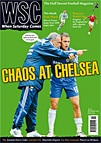 The Euro 2008 qualifiers between Armenia and Azerbaijan will remain pointless and unplayed. No one comes out of the affair well, including UEFA, as Dan Brennan explains
The Euro 2008 qualifiers between Armenia and Azerbaijan will remain pointless and unplayed. No one comes out of the affair well, including UEFA, as Dan Brennan explains
The decision by UEFA, after 18 months of bureaucratic fudge, to cancel September’s double-header between Azerbaijan and Armenia was depressing on all fronts. Depressing because it underlined that, over a decade after a ceasefire officially ended armed conflict between the two countries, they still can’t agree on anything. Depressing, too, because of the failure on UEFA’s part to act swiftly to resolve a situation where alternatives were available.
Before the qualifying draw in January 2006, UEFA sent out a letter to every FA setting out the regulations for the qualifiers. All teams, it decreed, should play their home games in their own countries and the state should guarantee the security of visitors. As soon as Armenia and Azerbaijan emerged from the hat together in Group A, it was patently clear that those conditions were never going to hold.
Between 1988 and 1994, the two countries, at the outset both Soviet republics, were engaged in a bloody armed conflict that cost around 17,000 lives and saw more than a million people displaced. The dispute over Nagorno-Karabakh, an enclave located within Azerbaijan but to which the Armenians claimed historic ownership, has deep roots, but only resurfaced as glasnost and a relaxing of central control by Moscow allowed old grievances to resurface. By 1994, Armenia had captured the enclave, as well as several territories in Azerbaijan proper. Until the war, the two nations had lived, for the most part, peacefully, and both had large mixed populations. Though Armenia is Christian and Azerbaijan is Muslim, they also shared much in terms of cultural heritage. Thirteen years after open hostilities ended, the conflict continues to fester under the surface, after repeated failures on the part of international mediators to broker an agreement.
When the draw was made, the Armenian FA said the matches should be staged in the respective capitals of Yerevan and Baku. The Azeris, more predictably, declared this an impossibility. Fuad Asadov, general secretary of the Azerbaijani FA, said that they would rather face suspension from UEFA than host the Armenia team, citing political and security risks. Azerbaijan’s minister of youth and sport, Azad Rahimov, suggested that the two matches could be played instead in Austria, Switzerland or Ukraine. “We cannot raise the flag and perform the national anthem of a country which is occupying a large part of our territory,” Rahimov said. “There is also a technical aspect to the question, which is that we cannot guarantee the security of the whole team and of the fans.”
According to Lev Navasardian, head of the Yerevan Press Club, Armenia’s willingness to play the games in Yerevan and Baku was not necessarily a sign of a more progressive attitude, merely a better grasp of PR. “I don’t want to create the impression that the Armenians are behaving constructively and the Azeris destructively,” he said. “It’s simply that in the situation we have Armenia is taking tactical steps in order to demonstrate its constructive attitude and agreement for the game to take place in Yerevan, so as to win the advantage in the football contest.”
The Azeris, meanwhile, were all too happy to guarantee the safety of the Armenian team that travelled to Baku in September for the 2007 World Wrestling Championships. The differing stance may have something to do with the fact that the Armenian wrestlers were not expected to make a big impact. Their football team, by contrast, had shown major signs of improvement under coach Ian Porterfield, who died in September. Having won their last two qualifiers, including a shock 1‑0 victory over group leaders Poland, they would have been firm favourites against the Azeris, bottom of Group A.
A defeat for Azerbaijan on home turf at the hands of the enemy would have been more than a major blow to national pride and a chance for the victor to indulge in some political posturing. “I regret that we lost an opportunity to see the matches of our team, whose play is becoming stronger and more spectacular day by day,” said Armenian FA chairman Ruben Hayrapetian, with a touch of triumphalism.
UEFA had convened a series of somewhat pointless meetings designed to end the deadlock. Of course, it is hardly surprising that they were unable to succeed where international peacebrokers have, for more than a decade, failed. However, the fact that it took them until June this year simply to cancel the fixtures says little for their efficacy. There were alternatives. Both Georgia and Moldova had proactively volunteered to act as hosts for the games. Not ideal, but realistic. Instead, the outcome was that everyone involved scored zero points. Including UEFA.
From WSC 249 November 2007